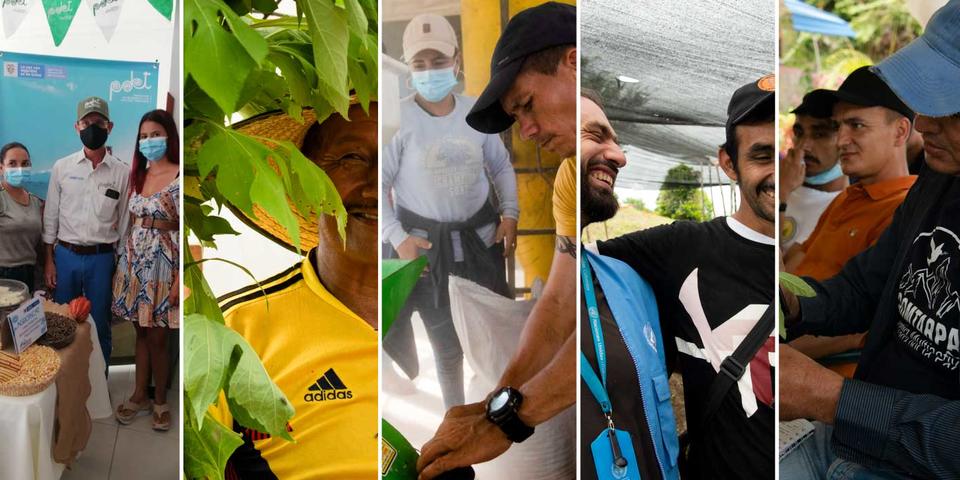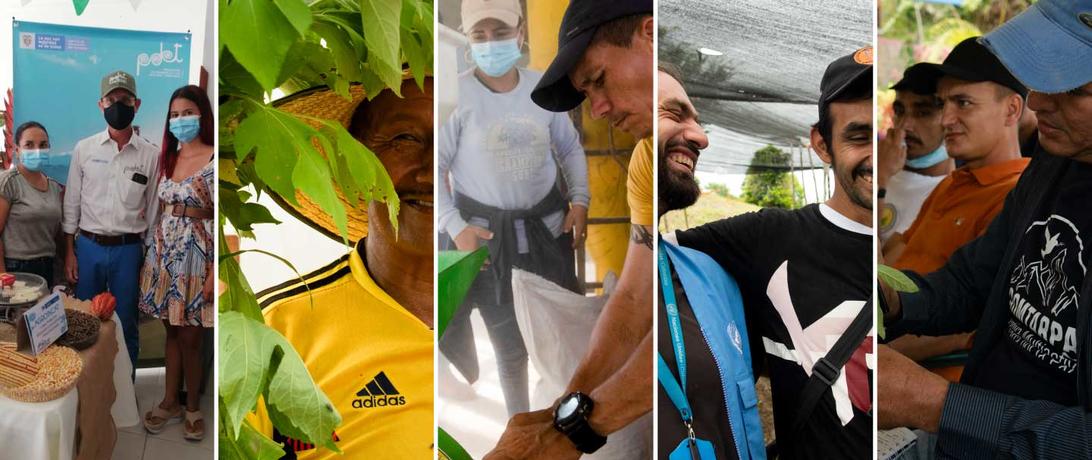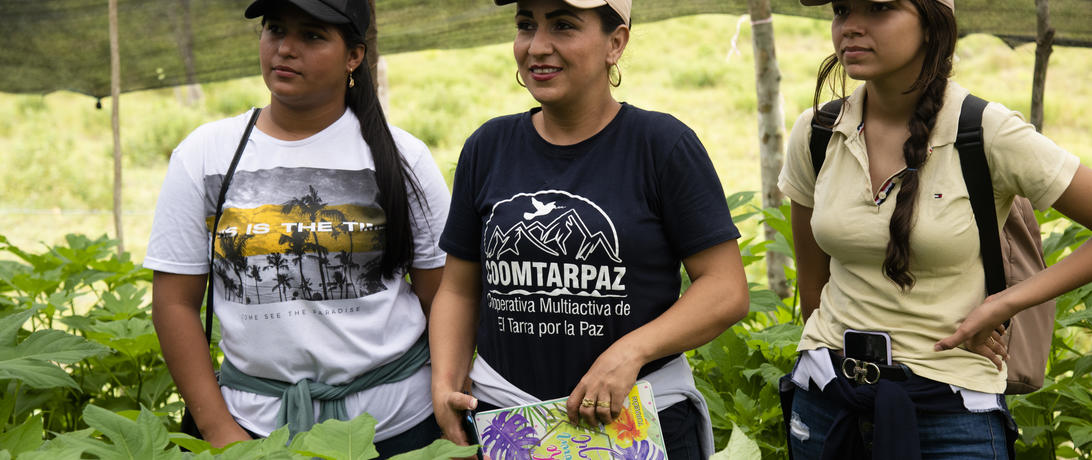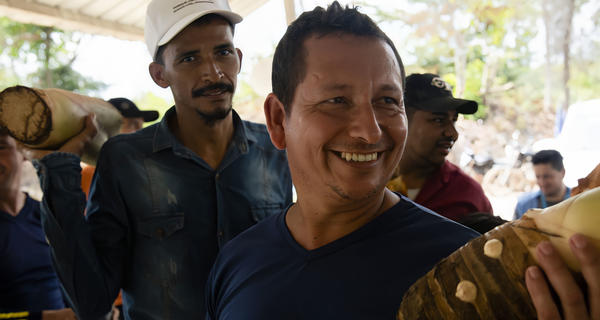
The Kroc Institute of the University of Notre Dame, in charge of verifying and monitoring the implementation of the Peace Agreement in Colombia, has considered that the model of collaborative work between farmers and peace signatories promoted by PASO in the Catatumbo Peace Network is an example of good practices in peacebuilding. In its recently presented report Territorial implementation experiences: Catatumbo, the Kroc Institute invites both the national government and local authorities to carry out actions to support this initiative, which already brings together seven associations in the region with the support of the UN Verification Mission and the Francisco de Paula Santander University.
The report highlights the transformative potential of the Catatumbo Peace Network, which promotes the sustainability of the productive initiatives of peace signatories and the campesino (rural farmer) population in the region. In addition, it highlights its fundamental role in strengthening the community fabric through the generation of solid alliances, the construction of agreements for collaborative work, and the consolidation of the productive vocation of each association and cooperative.
The Kroc Institute periodically provides independent, impartial, and academically rigorous information on the implementation status of the Final Agreement. These reports aim to promote the progress of the Final Agreement and foster an enriching public dialogue for peace and development in Colombia.
DOWNLOADS
Complete report (Spanish version): Territorial experiences of implementation: Catatumbo
Document extract:
"COLOMBIA BAROMETER INITIATIVE
TERRITORIAL IMPLEMENTATION EXPERIENCES: CATATUMBO
ASSOCIATIVE FORMS OF PEOPLE IN THE PROCESS OF REINCORPORATION IN THE CATATUMBO PEACE NETWORK
The Catatumbo Peace Network brings together seven different associative forms of people in the reincorporation process and farmer cooperatives. Its purpose is to promote collaborative work, strengthen associations and increase product marketing channels. The network is led by PASO Colombia, the UN Mission, and the Universidad Francisco de Paula Santander Ocaña (UFPSO).
Three associations are located in Tibú: la Cooperativa Multiactiva de Compra y Venta del Catatumbo (COMPROCAT), la Asociación para la Reconciliación y la Paz en el Catatumbo (REPAZCAT), and AGROINCAT. COMPROCAT develops agricultural production projects in the AETCR of Caño Indio. At the same time, REPAZCAT has a poultry breeding project awaiting the preparation of the property to be implemented, and AGROINCAT produces concentrates and harvests its raw material. In El Tarra, for its part, the El Tarra Multiactive Cooperative for Peace (COOMTARPAZ) is present. This association is dedicated to cattle raising and planting cocoa and vegetables. COOMTARPAZ, together with COODEPAZC, located in San Calixto, and REINCOPAZ, located in Teorama, have formed a collective productive initiative through which to build and start up a biofactory for the production of organic fertilizers. Finally, in Cúcuta, the Cooperativa Multiactiva Paz Común (COMPAC) constitutes an associative form of solidarity economy and is considered the collection and commercialization node of the Catatumbo Peace Network. However, these activities were not active due to various difficulties, some of them related to the land available to them.
From the documentation of the experience, the Kroc Institute was able to observe that the technical support and the work of organizations such as the UN Mission, PASO Colombia, and the UFPSO have energized the Catatumbo Peace Network and, in general, the reintegration process in this region. In contrast, the support from most municipal mayors’ offices and the Governor's Office has been insufficient. Different actors with whom the Kroc Institute spoke agree that greater political will and technical support are essential for the development of the reintegration process. This limits the scope of the impact that these associative forms could generate. Additionally, the Kroc Institute verified the need to modify the respective Land Management Plans, as their outdatedness represents a barrier to accessing land so productive projects can be efficient and sustainable. Likewise, the poor state of the roads hinders regional development and, consequently, harms the reintegration process. Difficulties in road access affect the provision of inputs and the marketing processes for the sustainability of productive projects.
From the perspective of the gender approach, the Kroc Institute identified that despite the high presence of women in the different associative forms of people in the reintegration process, their participation in decision-making and representation scenarios could be more significant. Only one of the mixed associative forms visited by the Kroc Institute is currently led by a woman, and only one productive initiative is made up and led by women. Among the reasons that hinder the participation of women in these scenarios are the tasks of care and domestic work that they carry out in their families, as well as the lack of redistribution measures that allow these tasks not to be an obstacle for them. In the framework of the limited institutional offer by the mayors’ offices and the Governor’s Office, there was no evidence of specific programs or actions aimed at strengthening the decision-making participation of women in the reintegration process or at guaranteeing their rights from a gender perspective. In the case of the permanent support provided by the CNR Comunes to productive projects, greater incorporation of the gender approach and measures that promote women's leadership in these are also required.
The Kroc Institute highlights the potential of the Catatumbo Peace Network to contribute to the sustainability of the productive initiatives of people in the process of reintegration and farmer population in the region, as well as to strengthen the community fabric. The generation of alliances, the construction of agreements for collaborative work, and the consolidation of the productive vocation of each association and cooperative are fundamental to prospering these processes in Catatumbo. However, achieving the purposes of the Network requires urgent governmental actions that go beyond the scope of action of the organizations that have taken on the promotion of the network to advance in the resolution of issues related to land use and legal definition, the state of several properties where these associations are located, the improvement of roads, security guarantees, support in marketing chains, among others".


